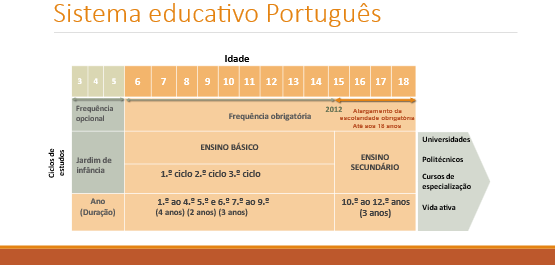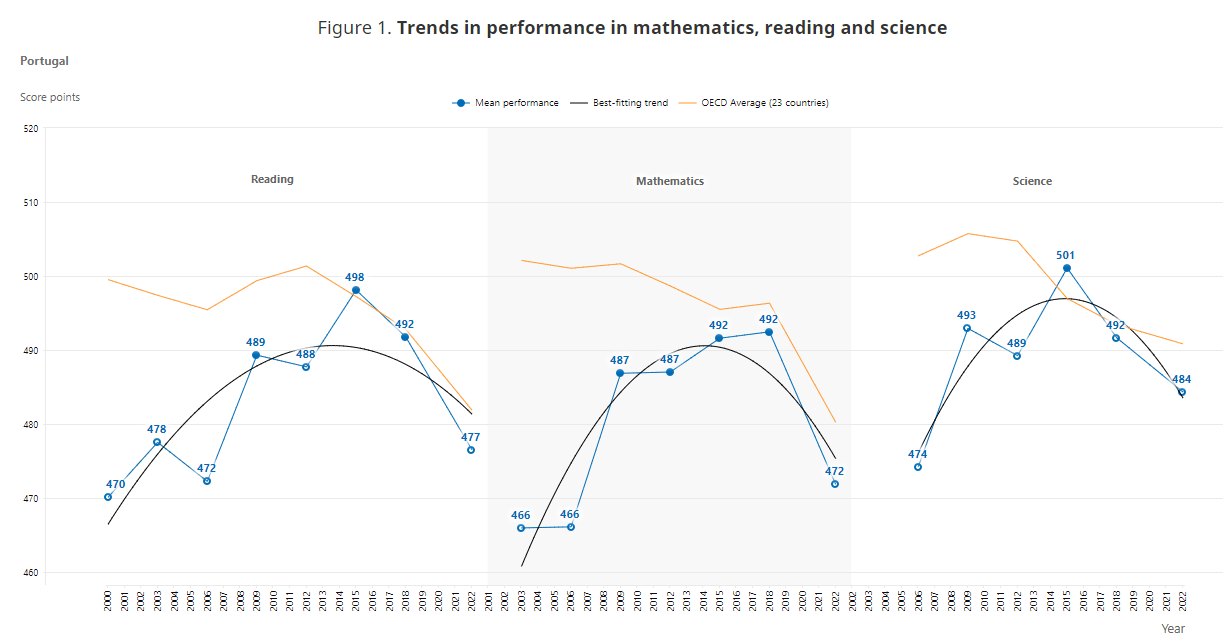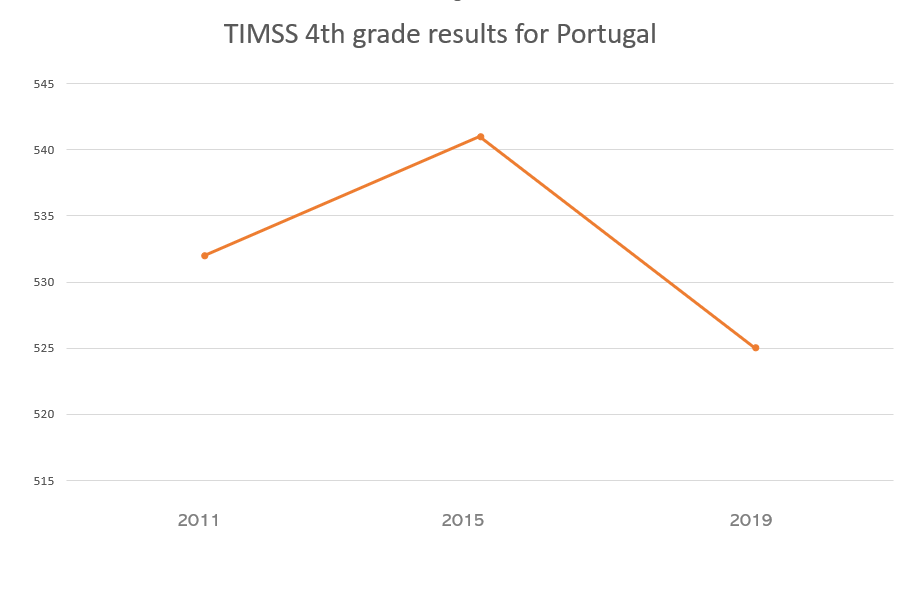Database Project Portugal
Presentation of the Portuguese educational system
The Portuguese education system is divided into different education cycles.

It begins with pre-school education, a cycle of optional attendance from three to six years of age, which is the age of entry into compulsory schooling (from six to 18 years of age). Since 2012, compulsory schooling integrates primary and secondary education.
Basic education has a single pathway for all students, although in some specialized schools there is an artistic education offer – specialized artistic courses (CAE) – which adds complementary training in an artistic area to the general curriculum.
Basic education comprises three sequential cycles:
- the 1st cycle, which lasts four years - from the age of six to nine – and corresponds to ISCED1 1;
- the 2nd cycle, lasting two years - attended by 10- to 11-year-olds – completing ISCED 1;
- the 3rd cycle, with a duration of three years – attendance from 12 to 15 years of age, on average – corresponding to ISCED 2.
Secondary education is a three-year cycle (10th, 11th and 12th grades) – attended from 15 to 18 years of age, on average – corresponding to ISCED 3 and aims to provide students with training that is compatible with further study or entry into the labour market. To this end, it includes five types of courses: • Scientific-humanistic courses • Professional courses • Specialised artistic courses • Courses with their own plans (Scientific-Technological Courses) • Apprenticeship courses.
Once compulsory schooling is over, there are two ways to continue the studies:
- Post-secondary non-tertiary education, corresponding to ISCED 4;
- Short-term higher education, corresponding to ISCED 5.
Higher education is structured according to the Bologna principles and is aimed at students who have successfully completed secondary education. It comprises bachelor’s programmes, corresponding to the 1st Bologna cycle - ISCED 6 -, master's programmes, corresponding to the 2nd Bologna cycle - ISCED 7 - and finally, doctoral programmes, corresponding to the 3rd Bologna cycle - ISCED 8.
CURRENT SITUATION
The Portuguese education system has undergone several significant changes over the course of the 21st century, which are important to note in order to understand the indecisiveness of the current situation.
Between 2000 and 2015, the system evolved towards greater precision in the curriculum and more rigorous and frequent assessment.2 In 2002, exams were introduced at the end of the then compulsory schooling (9th grade); in 2006, a law was passed to improve school textbooks; in 2010, learning goals were introduced, then revised and detailed between 2011 and 2014 (links below); in 2012 and 2013, final exams were introduced respectively in the 1st and 2nd cycles of basic education.
The 2015 results of the OECD's Program for International Student Assessment, PISA, and the IEA Trends in International Mathematics and Science Study, TIMSS, show a significant rise in education in Portugal.
However, in 2016 the situation was reversed. Standardized assessments in the 1st and 2nd cycles were abandoned, curricular programs and learning goal documents were replaced by so-called Essential Learnings (“Aprendizagens Essenciais”), which were much less detailed, and a policy of curricular flexibilization was established allowing schools to avoid more demanding areas of the curriculum (links below).
Currently (summer 2024), a new government has promised to turn the situation around again in the face of the poor results obtained in international assessments after 2015, both before and after the pandemic. There is therefore uncertainty about the education system in the coming school years, which is why this somehow lengthy description is included here. To better understand the magnitude of the ups and downs up to 2015 and after 2015, the PISA and TIMSS graphs are inserted below.

Figure 1. Source: OECD, https://www.oecd.org/en/publications/pisa-2022-results-volume-i-and-ii-country-notes_ed6fbcc5-en/portugal_777942d5-en.html

Figure 2. Source: International Association for the Evaluation of Educational Achievement, Trends in International Mathematics and Science Study (TIMSS), 2011, 2015, and 2019 Mathematics and Science Assessments.
CURRICULUM GUIDELINES AND ASSESSMENT
Currently, the guiding principles for the organization and management of the primary and secondary school curriculum, as well as for the curriculum development process and assessment, are outlined in Decree-Law no. 55/2018, 6 July.
According to this Decree-Law, and as in the previous legislation, the evolution of the educational process of students in Basic Education assumes a cycle logic, with the student who has developed the learning defined for each cycle of education progressing to the next cycle.
Assessment in basic education currently involves only final cycle exams (compulsory) at the end of nine years of basic education, in the 9th year of schooling, in the subjects of Portuguese Portuguese as a Non-Mother Tongue (PLNM) and Maths, which cover the content taught throughout the 3rd cycle of basic education.
Benchmarking tests are currently planned (summer 2024) at the end of the 1st and 2nd basic cycles.
Assessment in secondary education comprises four national exams, held in the final year of each subject, the results of which are taken into account for the final classification.
Students who pass all the subjects on the syllabus for their respective course will graduate from secondary school and be able to apply for higher education.
There are also specific dual certification programmes for young people at risk of dropping out of school, aimed at completing compulsory schooling and entering working life, but with the possibility of meeting requirements that allow them to go on to higher education.
Programs and Learning Goals
Curricular programmes and Learning Goals for basic education, approved by Order no. 10874/2012 of 10 August: PDF
Programmes and Learning Goals for Secondary Education approved by Order 868-B/2014 of 20 January: PDF
The Essential Learnings (EL) for Basic Education were approved by Order 6944-A/2018 of 19 July.
- Grade 1: PDF
- Grade 2: PDF
- Grade 3: PDF
- Grade 4: PDF
- Grade 5: PDF
- Grade 6: PDF
- Grade 7: PDF
- Grade 8: PDF
- Grade 9: PDF
The Essential Learnings (EL) for Secondary Education were approved by Order 8476-A/2018 of 31 August.
References
Crato, N. (2020). Curriculum and Educational Reforms in Portugal: An Analysis on Why and How Students' Knowledge and Skills Improved. In: Reimers, F.M. (ed.), Audacious Education Purposes. Springer. https://doi.org/10.1007/978-3-030-41882-3_8
Crato, N. (2022). Math curriculum matters: Statistical evidence and the Portuguese experience. European Mathematical Society Magazine, 124, 49-56 https://ems.press/journals/mag/articles/5846439
Marôco, J. (2021). Portugal: The PISA Effects on Education. In: Crato, N. (ed.), Improving a Country's Education. Springer. https://doi.org/10.1007/978-3-030-59031-4_8
1International Standard Classification of Education, https://uis.unesco.org/en/topic/international-standard-classification-education-isced. See also https://isced.uis.unesco.org/wp-content/uploads/sites/15/uis_isced_uploads/ece52e5ca3d4f6c2e2bf85691cb1bbbb.jpg
2Description and detailed references in Crato (2019)